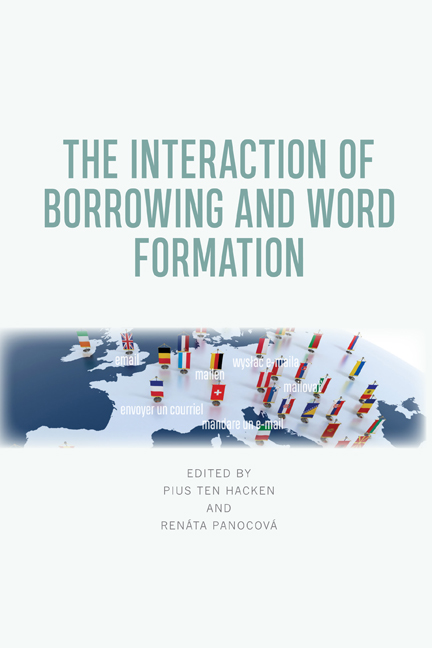Book contents
- Frontmatter
- Contents
- List of Figures and Tables
- List of Contributors
- Preface
- List of ISO-639 Language Codes
- Introduction
- 1 Word Formation, Borrowing and their Interaction
- Part I Compounding
- 2 Compounding and Contact
- 3 Neoclassical Compounds between Borrowing and Word Formation
- 4 Borrowed Compounds, Borrowed Compounding – Portuguese Data
- 5 Compound Calques in an Eighteenth-Century German-Lithuanian Dictionary
- 6 (Pseudo-)Anglicisms as Nominal Compounds in Italian
- Part II Affixation
- 7 The Role of Borrowing in the Derivation of Passive Potential Adjectives in Polish
- 8 How an ‘Italian’ Suffix Became Productive in Germanic Languages
- 9 The Suffixes -ismus and -ita in Nouns in Czech
- 10 The Interaction between Borrowing and Word Formation: Evidence from Modern Greek Prefixes
- Part III Naming in Minority Languages
- 11 Loanword Formation in Minority Languages: Lexical Strata in Titsch and Töitschu
- 12 Examining the Integration of Borrowed Nouns in Immigrant Speech: The Case of Canadian Greek
- 13 Interaction among Borrowing, Inflection and Word Formation in Polish Medieval Latin
- Conclusion
- 14 Trends in the Interaction between Borrowing and Word Formation
- Author Index
- Subject Index
9 - The Suffixes -ismus and -ita in Nouns in Czech
Published online by Cambridge University Press: 22 September 2020
- Frontmatter
- Contents
- List of Figures and Tables
- List of Contributors
- Preface
- List of ISO-639 Language Codes
- Introduction
- 1 Word Formation, Borrowing and their Interaction
- Part I Compounding
- 2 Compounding and Contact
- 3 Neoclassical Compounds between Borrowing and Word Formation
- 4 Borrowed Compounds, Borrowed Compounding – Portuguese Data
- 5 Compound Calques in an Eighteenth-Century German-Lithuanian Dictionary
- 6 (Pseudo-)Anglicisms as Nominal Compounds in Italian
- Part II Affixation
- 7 The Role of Borrowing in the Derivation of Passive Potential Adjectives in Polish
- 8 How an ‘Italian’ Suffix Became Productive in Germanic Languages
- 9 The Suffixes -ismus and -ita in Nouns in Czech
- 10 The Interaction between Borrowing and Word Formation: Evidence from Modern Greek Prefixes
- Part III Naming in Minority Languages
- 11 Loanword Formation in Minority Languages: Lexical Strata in Titsch and Töitschu
- 12 Examining the Integration of Borrowed Nouns in Immigrant Speech: The Case of Canadian Greek
- 13 Interaction among Borrowing, Inflection and Word Formation in Polish Medieval Latin
- Conclusion
- 14 Trends in the Interaction between Borrowing and Word Formation
- Author Index
- Subject Index
Summary
In this chapter, the interplay between borrowing and word formation (in particular, derivation) is documented on the example of the suffixes ‑ismus and ‑ita, which are listed among the most common suffixes in loan nouns in Czech (e.g. Čechová et al. 1996: 93; Karlík et al. 2000: 140). These suffixes are of Greek origin, in Czech their Latinised version is used (Šimandl 2016). They have direct counterparts in English (-ism and -ity), German (-ismus and -itat), French (-isme and -ité) and other languages, as illustrated in (1).
(1) a. subjektivismus, subjektivita CS
b. subjectivism, subjectivity EN
c. Subjektivismus, Subjektivitat DE
d. subjectivisme, subjectivité FR
Although most of the nouns in -ismus and -ita correspond both formally and semantically to nouns in one or even more foreign languages, and comply thus with the definition of internationalisms (Jiráček 1984; Ivir 1989), in the present chapter they are analysed as a part of the lexicon and, moreover, of the word formation system of Czech.
After a brief summary of how nouns with both suffixes have been approached in Czech linguistics so far (section 1), section 2 is devoted to the compilation and analysis of the language data set, the core of which is a list of nearly 1,100 nouns ending in ‑ismus and ‑ita extracted from a representative corpus of Czech (SYN2015, Křen et al. 2015). Attention then turns to derivatives which share their root with the nouns in ‑ismus and ‑ita.
The observation that internationalisms are members of larger derivational families or, in the word formation perspective, that they serve as bases for derivation of further words was discussed as one of the characteristics typical of internationalisms in West‑Slavic languages by Waszakowa (2003); cf. also Buzássyová (2010) for Slovak. What is in focus here are the differences among the derivational families: particular nouns in ‑ismus and ‑ita share their roots with a different number of derivatives formed by different suffixes. By analysing the size and inner structure of derivational families, I point out that there are correlations between what a particular derivational family looks like and what meaning the derivatives involved have. The analysis then results in the description of several, most striking meanings of the suffixes ‑ismus and ‑ita in Czech in section 3.
- Type
- Chapter
- Information
- The Interaction of Borrowing and Word Formation , pp. 162 - 195Publisher: Edinburgh University PressPrint publication year: 2020



